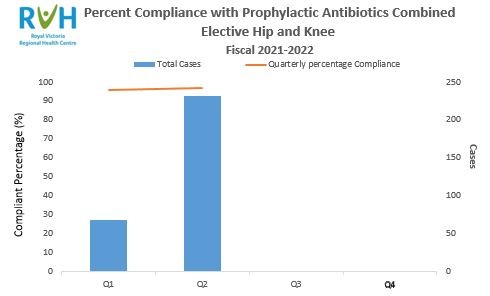What is a Surgical Site Infection?
A surgical site infection (SSI) occurs at the site of a surgical incision. Germs can get into the incision area, and cause an infection. It can develop within 30 days of an operation, or sometimes even up to one year if an implant (such as a knee or hip joint implant) is used.
Infections can be minor, or occasionally they can increase complications that result in a longer length of stay in the hospital, or an increased readmission rate for patients. Post- operative SSIs are the most common health care-associated infections in surgical patients.
How is the SSI Prevention Indicator Calculated?
As of April 30, 2009, all Ontario hospitals that perform hip and knee joint replacement surgeries are required to post quarterly SSI-Prevention percentages to further promote accountability and transparency within the health system.
These Ontario hospitals are all posting their quarterly SSI-Prevention percentages for their facility, using the following formula:
Number of cases receiving Prophylactic Antibiotics, Divided by total hip/knee joint replacement cases.
surgeries who received usual surgeries who received vancomycin
antibiotics within 60 min of + within 120 min of skin incision x 100%
Total number of patients during the reporting period who had a primary knee/hip joint replacement
surgical procedure

| Q1 | Q2 | Q3 | Q4 | |
| Cases Receiving Antibiotics | 65 | 223 | ||
| Total Cases | 68 | 231 | ||
| Quarterly Percentage | 95.59 | 96.54 |
Why focus on SSI Prevention in Hip or Knee Joint Replacement Surgery?
Studies have shown that antibiotic prophylaxis administration just before a joint replacement is a good way to reduce the chance of infection. The goal of this indicator is to ensure one of the most important steps in preventing SSIs is being used – i.e., ensuring that antibiotics are administered at a certain time just before a hip or knee joint replacement surgery. This indicator is not a measure of actual surgical site infections.
The public reporting of this indicator will reveal the percentage of all eligible patients who get antibiotics at the right time, just before a “first time” joint replacement surgery. At the Royal Victoria Hospital we are working towards full compliance of this practice in every hip and knee joint replacement surgery.
What can patients do to help reduce their chances of infection?
Follow the pre-operation instructions given to you by your surgeon and health care team.
Frequent hand cleaning is another way to prevent the spread of infection. Hand hygiene involves everyone in the health centre.

